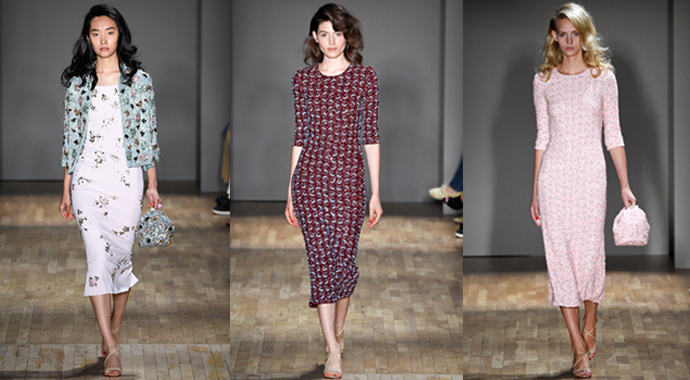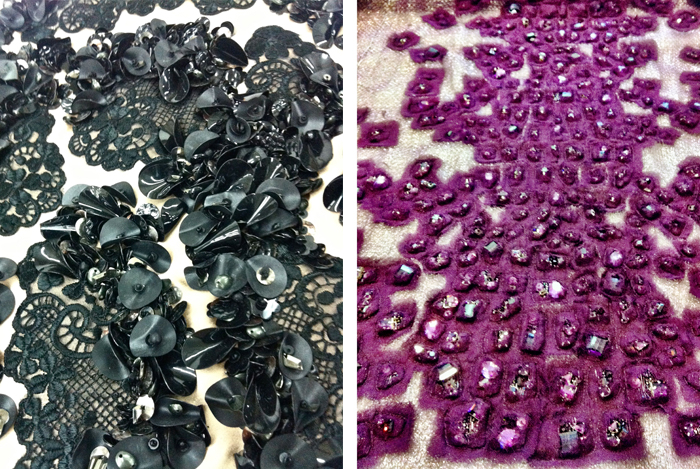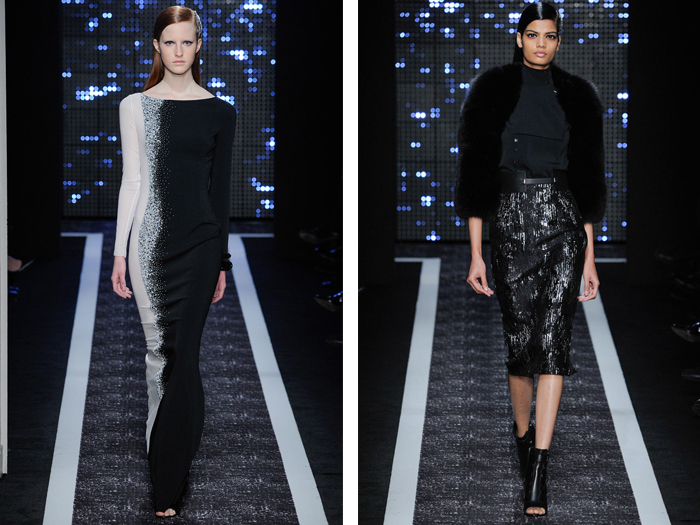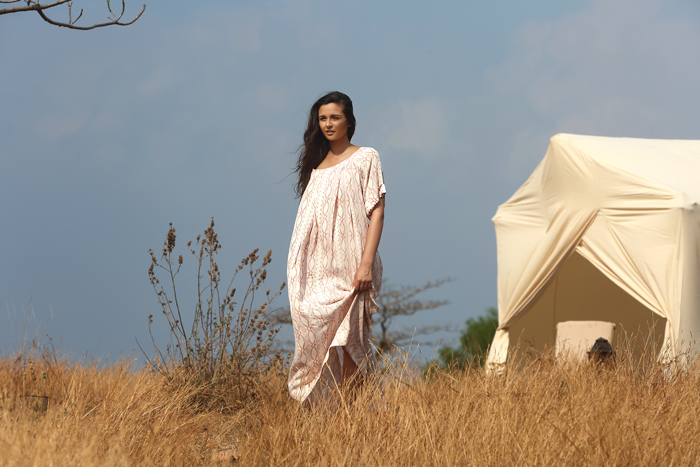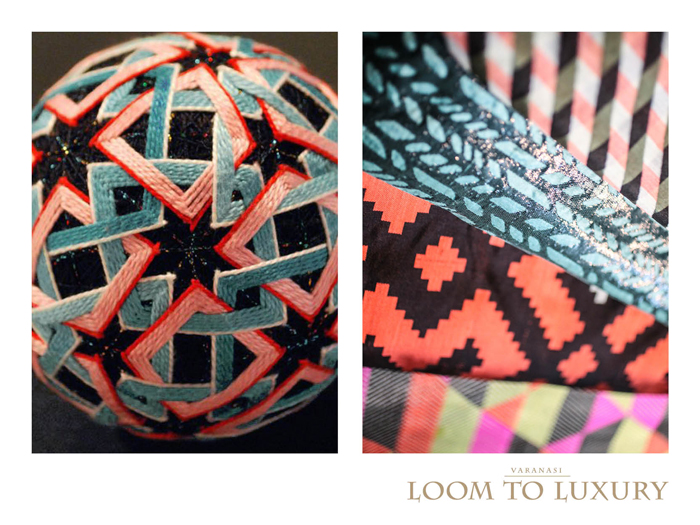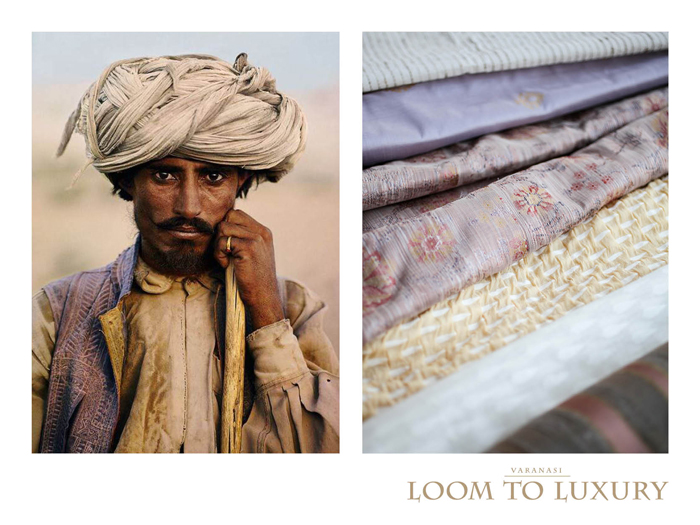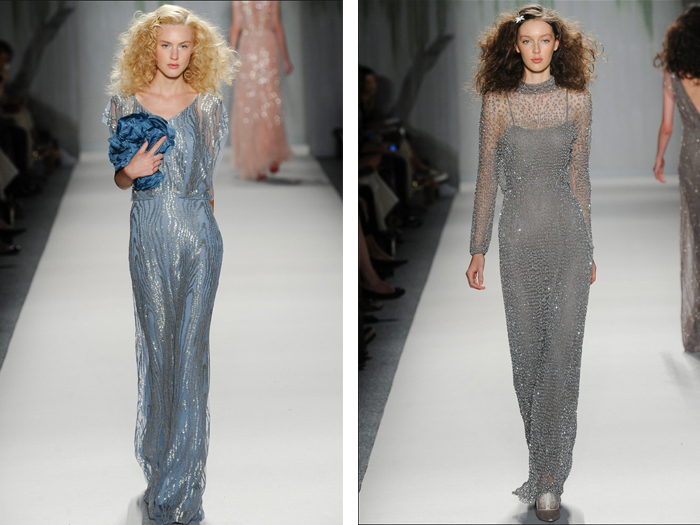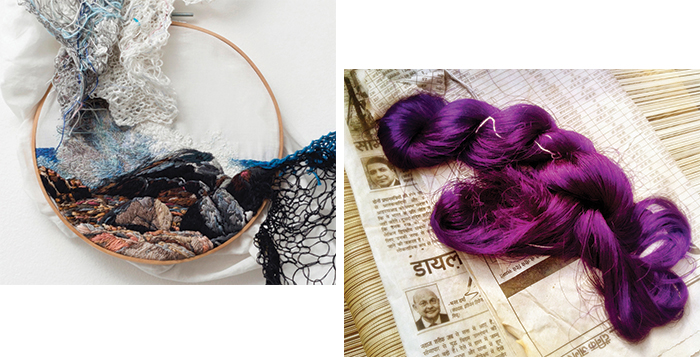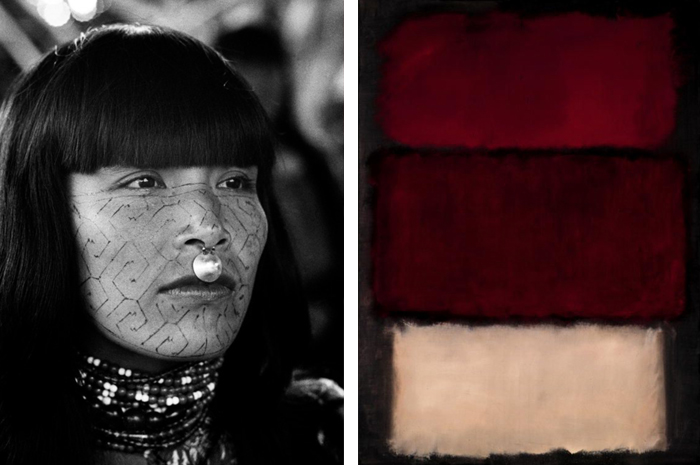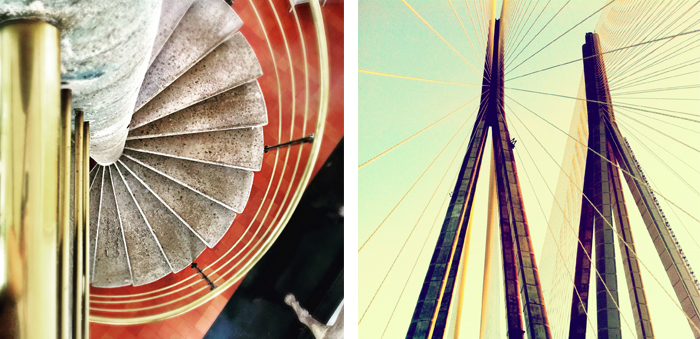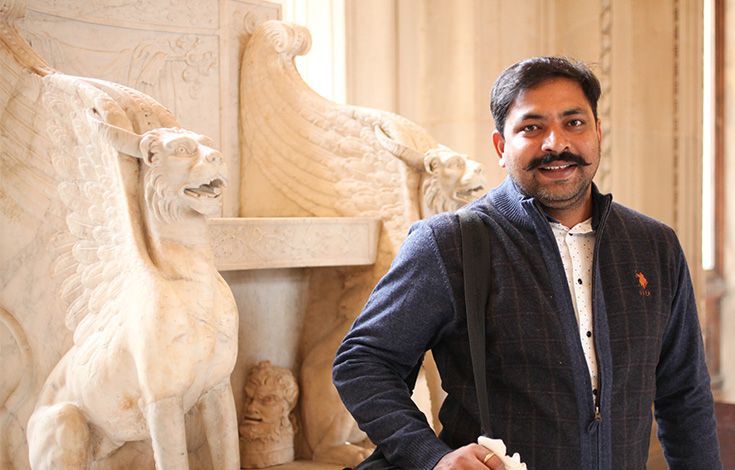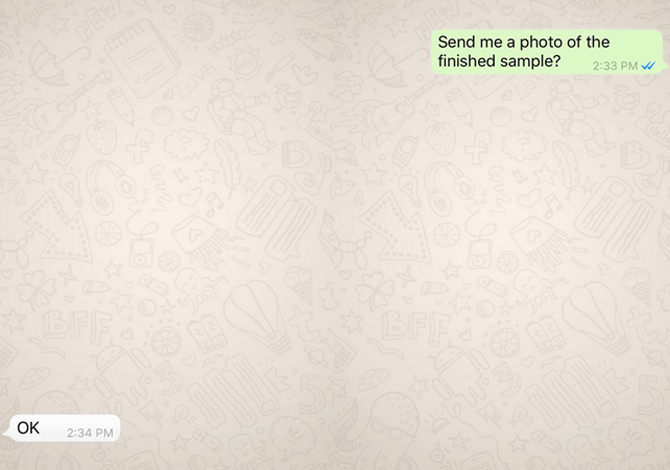Founder of hi-fashion manufacturing units, DTM Resources and DTM Collective, Megan has made a business turning around the clinical, passionless process of production into a mindful and ethical chain of events. Based out of New York and Mumbai, she takes the time to visit her weavers, sit with embroiderers and understand tailors – then delivers stellar garments to clients who have included Versace, Jenny Packham, Erdem and Oscar de la Renta. Below are edited excerpts from her interview.
The Beginning > As children, my sister and I would often create imaginary worlds and spend time describing their detailed environment and elaborate clothing – setting the stage for adventures we would have. As we got older, these worlds found their way into our writing, artwork and (eventually) the collections I designed. From a young age, I was interested in all expressions of art – from making clothes for my dolls and sculpting in ceramics to writing prose and textile art.
I spent a summer in NYC as a 17-year-old to study fashion design at Parsons School of Design. That got me hooked! The following year I moved to New York to attend The Fashion Institute of Technology (FIT) and got the chance to spend my third year at Polimoda International Institute of Fashion in Florence, Italy – through a study abroad program offered by FIT.
Florence’s rich history allowed me to circle back to my roots in fine arts and weave interests such as sculpting and hand painting into the way I approached fashion.
At FIT, we were taught a more commercial approach to design – but being surrounded by incredible art in Florence and with professors supporting our creative exploration, I was free to think less commercially and more conceptually. The marriage of fine arts, fashion and a little bit of childhood imagination came together in a love for haute couture – not because of the luxury and glamour that people associate with high fashion but because of the incredible craftsmanship and fantasy that goes into designing it.
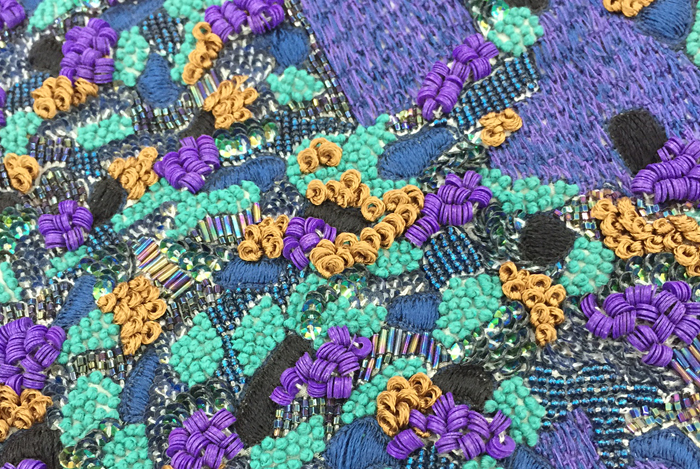
Above: Embroidery development image | Megan Ryley
Leaning into the genesis of craft > As I matured in my career – from an Assistant Designer to a Design Director in a multi-brand conglomerate – I was able to travel to workrooms and factories overseas to manage the development of collections. As my work was hands on, I started to become deeply interested in the people and root processes.
I would roll up my sleeves and get involved in all the processes from embroidery and printing to washing of fabric because it allowed me to gain an in-depth knowledge of production. I really enjoyed speaking to people who worked on the garments directly with their hands – planting seeds, weaving fabric, cutting patterns, stitching the garment – the influences are so vast.
I enjoyed asking them questions and understanding the various aspects of garment making from start to finish. I met a 5th generation block printer once who had grown up learning the craft from his father. I remember being fascinated as he explained different techniques and how to tell the difference between an old heritage block and a newer one. Such stories started to inspire me more and more.
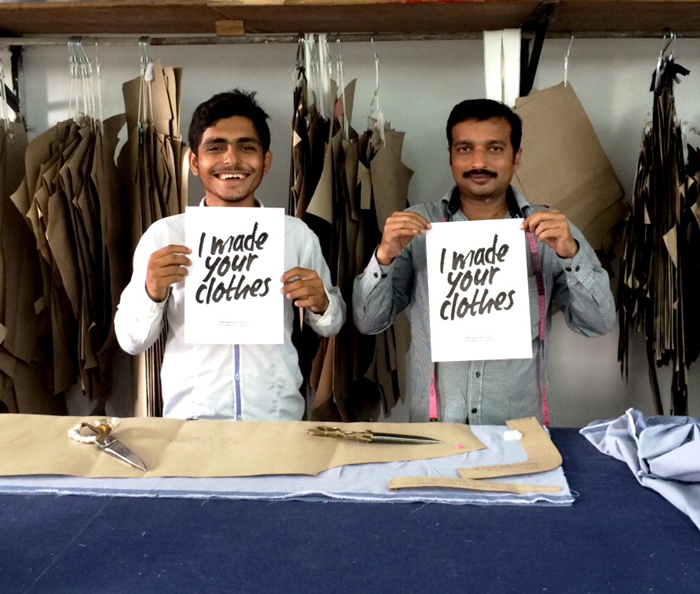
Above: Supporting ‘Fashion Revolution Week’, April 2016 – DTM Collective employees in Mumbai image | Megan Ryley
Eventually, I became so interested in the root processes of making a garment that I wanted to be closer to the product itself. That led me to India, to a position as a Product Development Consultant… and later to start my own manufacturing units for designer garments with my husband, Tarun – DTM Resources in 2009 and DTM Collective in 2015.
Both companies were created from the desire to build a more sustainable and ethical business, while working with designer products where we could focus on the details and promote all of the incredible handcraft that India has to offer.
DTM stands for ‘Design to Manufacture’. DTM Resources is a traditional piece rate manufacturer (where the manufacturer earns his profit per piece) that adheres to strict ethical standards even though it makes us less cost competitive. We don’t simply manufacture a product – we support in-depth sourcing and development of it without cutting corners on the production unit, quality of materials used, wages paid, over-committing production capacity or outsourcing.
DTM Collective, on the other hand, does not charge per piece rate – we charge a flat monthly rate from the designers who we work with. We give them a “block” in our Mumbai facility, along with a dedicated team who helps them see the project through – from sourcing and concept development all the way to manufacture and shipment of final product.
DTM Collective (focused predominantly on men’s and women’s apparel) is an accelerator born out of our endeavour to offer ethical manufacturing in a fully transparent, collaborative model. A few core things that are important to us when choosing who to work with are a strong sense of design aesthetic, value for a high level of craftsmanship, and dedication to supporting ethical practices.
Above: Embroidery development, WIP embroidery development for Atelier Versace, Fall 2013 couture images | Megan Ryley
Tipping point > Before I moved to India in 2007, I was working in NYC with a multi-brand company who, at some point, asked me to produce a sample collection for them in a totally unrealistic time frame. In order to complete it on time, they flew me to India to work onsite with the factory to push it through in less than 10 days. The team worked tirelessly to get it done and delivered it to me at the airport on the day of my departure.
The collection sold well, but when it came time to pass on the production orders my employer placed it with a factory in China because it was priced better by a few dollars. I was extremely frustrated and disenchanted by the entire experience. These feelings planted the seeds for the choices I later made to leave NYC and work directly within a factory environment in Bangalore, India.
Once in the factory set-up, I soon realised that unrealistic cost margins and delivery expectations from the buyers, along with a lack of understanding, are inherent issues within the production system on the whole.
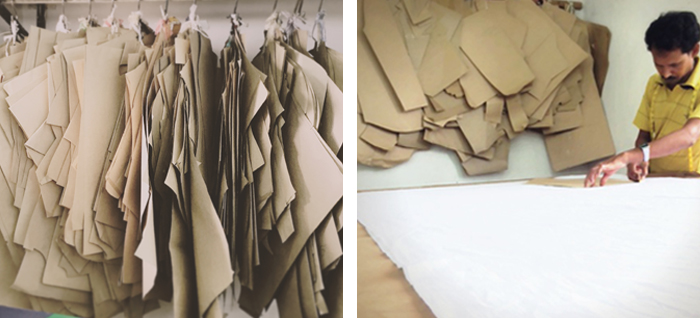
Above: Patterns hanging in DTM Collective Mumbai, Cutting master at DTM Collective Mumbai images | Megan Ryley
The larger picture is a total separation between buyer and maker. When we close our eyes to the actual people who are producing for us, it is easier to care only about numbers and profit margins. I do not like that system – I really wanted to create an environment of collaboration and mutual responsibility within my companies.
Business x social movement > I am really impressed with the many brands today that are not only stepping up to the challenge of pushing the fashion industry towards more ethical practices, but are thriving in their insistence to operate with these principles at their core. I did not grow in an industry centred around these practices – in the past, companies placed a huge importance on earning every percent of their margin despite the toll it would take on the backs of others. It is incredible that the conversation and focus is finally starting to shift away from pure profit to the demand for transparent and ethical practices.
Above: Maxine Simeons, Fall 2014 RTW – embroidery developed and produced by DTM Resources image |Umberto Fratini
Early pioneers in ethical manufacturing like designer Eileen Fisher proved that it can be done. And new companies like e-fashion retailer Everlane are also innovating. Brands like New York-based Behno, who we have the pleasure of working with, are showing everyone how a deep commitment to ethical practices can be the centre of an entire company culture. All of these different models inspire what I bring into my companies.
Brands in India are doing an incredible job in their support of traditional artisan craft but they can still work towards understanding and implementing international standards.Quality control, timely delivery and improved communication are areas that still require much improvement if Indian brands want to be recognized in the broader world market.
Above: The Orient Line, Edition 2 image | Ganesh Patil
Pleasing diverse aesthetics > Since I work in design as well as manufacturing, I am constantly looking at new materials, techniques and inspiration. We have to present fresh concepts to our clients every season – so I keep my eyes on what is happening in fashion, art and on the streets to take that into my work. It can be challenging to change hats at times; what I bring into my own collection, The Orient Line (an ethical lifestyle brand started with friend and partner Srimoyi Bhattacharya), is very different from what I present to the international clients because of the aesthetics. The Orient Line is a casual collection meant to be relaxed and lived in, while the other designers we manufacture for are predominantly high fashion and ready-to-wear collections. Diversity in work helps me to really have a wide vision and pull from many different sources. Beyond this, the most important thing we watch is quality and ensuring that we consistently produce premium level product. Since we only manufacture garments in India, we want to continue to push the bar on what is expected from India.
Above: Inspiration moodboards for Varanasi Loom to Luxury S/S ’16 fabrics designed by Megan Ryley image | Loom to Luxury
Women influencers > My mother, Kathleen Hintz, has been a constant source of inspiration throughout my life. From a young age, I have admired her tireless work ethic and determination to succeed in her career – while raising my sister and me alone for the first few years of our lives.
Later, around three years into my own career, I was fortunate to have a wonderful boss Susan Mosey who mentored me. She showed me the value of working in a good team (especially a team of kickass ladies!) and keeping the drama of the industry at an arm’s length. She has since become a good friend who I often turn to for advice and perspective.
Above: Jenny Packham, Spring 2014 RTW – embroidery and garments developed and produced by DTM Resources image | Kim Weston
And most recently, I have been incredibly inspired by Rebecca van Bergen, the founder and executive director of Nest – a New York-based non-profit that helps artisans build sustainable businesses. I have had the immense pleasure of working on a project for Nest. By offering my skills and experiences as a designer who has worked with luxury fashion houses – I collaborated with Loom to Luxury (Varanasi-based social enterprise working to preserve handloom textiles while bettering weavers’ quality of life) to create exquisite fabrics produced by the handloom silk weavers, and present them to internationally known designers. Working through that project and seeing the many other projects and impact that Nest has made continues to inspire me to think different and work harder in my own mission.
Above: ‘Suspensión 3’ by textile artist Ana Teresa Barbosa, Silk thread and the daily news image | Megan Ryley
Digital and other references > Kinfolk, NYTimes and NYTimes Fashion, Business of Fashion, The Economist and National Geographic, to name a few…
I also follow a lot of fashion industry creatives on Instagram and love to see their inspirations – some of my favourites are The Row, CLO, Ashley Helvey, AnOther Magazine, M.Martin, Shaina Mote, Bodice and Anaak.
I have a wide range of appreciation for reading, music and the arts. What I choose at a particular point in time depends on my mood. I’m an avid reader – ‘Atlas Shrugged’ by Ayn Rand is a favourite, as is ‘A Fine Balance’ by Rohinton Mistry, and ‘Game of Thrones’ (books as well as the TV series) by George R. R Martin. I like a variety of music – 80s pop makes me happy because it takes me back to childhood days, though I am just as likely to put on Louis Armstrong, Indian Ocean, Adele, Tom Petty or Chromeo. I also really enjoy visiting museums and galleries for inspiration – sculpture, painting and decorative arts are all fair game!
Above: Shipibo Indian woman with face paintings in a village on the Ucayali river, 1962, photo by Thomas Hoepker, Untitled, 1960, Mark Rothko
Honestly, I spend 95% of my time working or thinking about working. If there is one thing that I try to do other than work, it is to travel as much as possible. I am lucky that travel is a big part of my job already – I live between Mumbai and New York and spend long durations in Europe as well. When I have any free time I try to choose a new destination to visit. People, culture, markets and cities inspire me so much! I love to explore the origins of craft and try to make it a point to seek out places where there is still a strong sense of tradition.
Above: Spiral staircase in Kerala, Sea-link bridge in Mumbai images | Megan Ryley
Work History >
DTM Collective – Founder/CEO, New York City & Mumbai. August 2015-Present
The Orient Line – Co-Founder/Design Director, Mumbai. August 2014-Present
DTM Resources – Founder/ Product Development & Design Director, New York City & Mumbai. February 2009-Present
Nest (Loom to Luxury) – Product Development & Design Consultant, New York and Varanasi. May 2014-January 2016
Product Development & Design Consultant – 2006-Present

